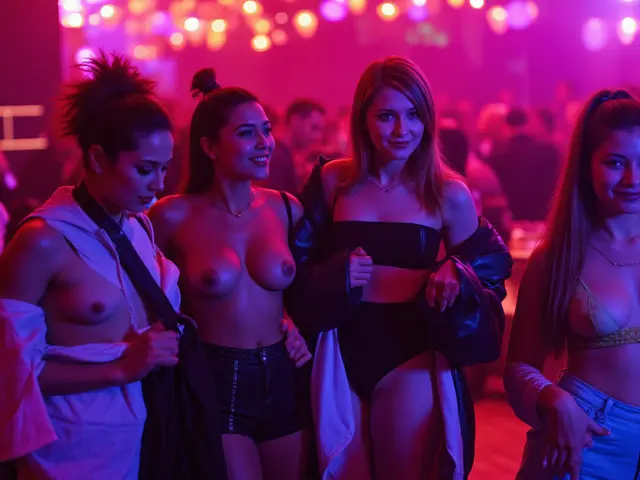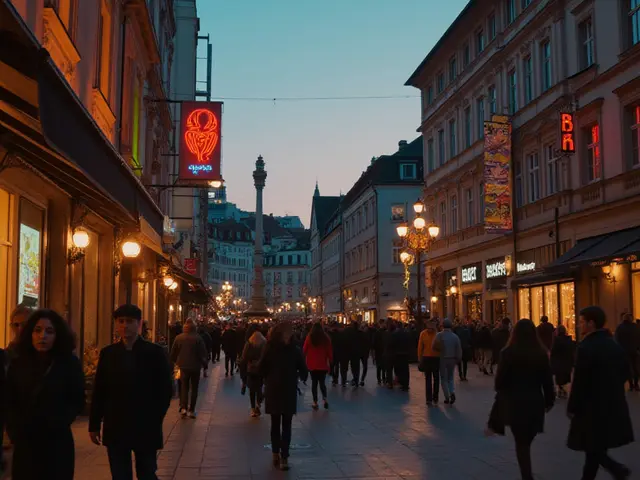You’ve seen them-graceful, confident, effortlessly stylish-walking through Marienplatz at sunset, sipping espresso in a leather jacket, or laughing in a dimly lit beer hall. They’re not just tourists. They’re part of Munich’s rhythm. The city doesn’t just host visitors-it enchants them, and many of those who leave with the strongest memories aren’t remembering the beer or the castles. They’re remembering the women.
What Makes Munich’s Female Presence So Unforgettable?
Munich isn’t Paris. It’s not Ibiza. It’s not even Berlin. But if you’ve ever wandered through the English Garden after dark or stood in line for a table at a rooftop bar in Schwabing, you’ve felt it: a quiet magnetism. The women here don’t scream for attention. They don’t need to. Their style, their poise, their ease in a city that moves between tradition and rebellion is what draws eyes-and not just because of how they look.
Think of it this way: Munich’s beer halls are full of men in Lederhosen. The museums are full of art from the 1800s. The streets are paved with cobblestones that haven’t changed in 150 years. And then-there’s her. A woman in minimalist black, hair pulled back, carrying a tote with a book and a coffee cup, gliding past it all like she owns the moment. That contrast? That’s the magic.
Who Are These Women?
They’re not one type. They’re not a stereotype. They’re students from LMU studying philosophy, dancers from the Bavarian State Ballet, freelance photographers from Berlin who moved here for the light, expats from London working in tech, and yes-some who work in modeling, hospitality, or entertainment. Many aren’t labeled. They don’t advertise. But their presence is undeniable.
Walk into a jazz club in Haidhausen and you’ll see women who look like they stepped out of a 1960s French New Wave film. Hit up a rooftop lounge in the Glockenbachviertel and you’ll spot women in tailored suits, talking business over gin tonics. In the Old Town, you’ll find women in long wool coats and ankle boots, browsing bookstores like they’ve lived here their whole lives. They’re not here to be seen. They’re here to live.
Why Do Visitors Notice Them So Much?
Because Munich doesn’t try to be glamorous. It’s practical. Efficient. Clean. And then-there’s a woman who looks like she belongs in a fashion editorial, yet she’s waiting for the tram like everyone else. That dissonance? It’s magnetic.
Studies show that people remember experiences that mix the familiar with the unexpected. Munich gives you tradition-Oktoberfest, cathedrals, sausages. Then it gives you a woman in a silk dress and combat boots, sipping a craft IPA while listening to a local band play jazz. That’s not just a moment. It’s a story.
And here’s the truth: most visitors don’t come to Munich for the beer. They come for the feeling. The feeling of being somewhere that’s polished but not plastic, historic but not frozen. And the women? They’re the living embodiment of that feeling.
Where to Spot Them-And Why It Matters
You won’t find them in tourist traps. Skip the Hofbräuhaus if you’re looking for authentic presence. Go instead to:
- Chinesischer Turm on weekends-locals gather here. You’ll see women in linen dresses, reading poetry or sketching the pagoda.
- Leopoldstraße after 8 PM-bars here attract creatives. Look for the woman with the vintage camera, the one who doesn’t take selfies.
- Englischer Garten near the Eisbach-surfers get all the attention. But watch the woman jogging in silence, headphones on, not posing for anyone.
- Maximilianstraße at dusk-luxury boutiques line the street. The women here aren’t shopping. They’re observing. You can tell by how they pause, tilt their head, and walk on.
These aren’t places you go to find someone. These are places you go to feel something. And if you’re lucky, you’ll feel it when you see her.
The Difference Between ‘Babes’ and Presence
Let’s be real-some people come to Munich looking for a ‘babe.’ They want to photograph, flirt, or buy attention. That’s not what this is about.
The women who enchant Munich aren’t there for your camera. They’re not curated. They’re not hired. They’re not part of a package. They’re real. And that’s why they leave such a mark.
There’s a difference between a model posing for a calendar and a woman walking down the street with a quiet confidence that says, ‘I don’t need to prove I’m beautiful-I just am.’ That’s the kind of presence that lingers in your memory long after you’ve left the city.
What to Expect If You’re Drawn to This Energy
If you’re visiting Munich and you find yourself noticing these women, don’t assume they’re there for you. Don’t approach. Don’t ask for photos. Don’t try to buy their time. What you’re seeing isn’t a service. It’s a culture.
What you can do? Be respectful. Be quiet. Be present. Sit at a café and watch. Read a book. Let them be part of the landscape. That’s how you honor the energy they bring.
Some visitors leave with a photo. Others leave with a feeling. The ones who stay longer? They come back because they couldn’t explain what they felt-but they missed it.
How Munich Compares to Other European Cities
Compare Munich to Paris: Paris has glamour. Berlin has edge. Rome has drama. But Munich? It has stillness.
| City | Style | Energy | Visibility | Authenticity Level |
|---|---|---|---|---|
| Munich | Minimalist, understated | Calm, grounded | Low-key, natural | High |
| Paris | Chic, performative | Artistic, dramatic | High | Medium |
| Berlin | Edgy, alternative | Rebellious, loud | High | High |
| Rome | Classic, sensual | Passionate, expressive | Very high | Medium |
| Amsterdam | Practical, casual | Free-spirited | Medium | High |
Munich’s women don’t perform. They exist. And that’s why they’re unforgettable.
Frequently Asked Questions
Are the women seen in Munich part of an escort or modeling industry?
Some women you see may work in modeling, hospitality, or entertainment-but most don’t. The women who leave a lasting impression aren’t there because they’re hired. They’re there because they live there. Munich has a strong arts scene, international student population, and growing tech sector. Many women are students, artists, designers, or professionals who moved here for work or love. Reducing them to a label misses the point.
Can I approach or ask for a photo with them?
No. Not unless they initiate it. Munich is a city of quiet boundaries. Women here value privacy and personal space. Approaching strangers for photos or conversations-even if you think you’re being polite-is seen as intrusive. The beauty of Munich’s atmosphere is in its unspoken respect. If you want to connect, engage with the culture: visit a gallery, attend a concert, sit in a beer garden. Let the moments come naturally.
Is there a specific neighborhood where ‘babes’ are more common?
There’s no ‘babe district.’ But if you want to see a high concentration of stylish, confident women, head to Schwabing, Haidhausen, or the Glockenbachviertel after dark. These are creative, intellectual, and culturally rich areas where people live-not just party. You’ll find artists, writers, and professionals who dress with intention. It’s not about quantity. It’s about quality of presence.
Do these women work in the adult industry?
Some individuals in Munich do work in adult entertainment, but that’s not what this article is about. The women who enchant visitors aren’t part of that scene. They’re not advertised, promoted, or packaged. They’re ordinary women living extraordinary lives in a city that values quiet elegance. Confusing the two undermines the real cultural richness of Munich’s female presence.
Why is this topic so often misunderstood?
Because people want to simplify beauty. They want to label it, monetize it, or categorize it. But Munich doesn’t work that way. The women who stand out aren’t there to be consumed. They’re there to be witnessed. And that’s a harder thing to sell. The truth? The most powerful beauty is the kind that doesn’t ask for attention. It just exists-and that’s what makes it unforgettable.
Final Thought
You won’t find a brochure about Munich’s ‘babes.’ There’s no tour. No Instagram hashtag. No club night named after them. That’s the point. Their power isn’t in being seen. It’s in being real. And if you’re lucky enough to be in Munich when the light hits the Isar just right, and you catch a glimpse of someone walking with quiet confidence-you’ll understand why this city doesn’t just attract visitors. It transforms them.





Laurie Ralphs
OMG I JUST SPENT A WEEK IN MUNICH AND YES-THE WOMEN ARE UNREAL 😍 I SAW THIS GIRL IN A BLACK TRENCH COAT WITH NEON GREEN SNEAKERS WALKING PAST A BEER HALL LIKE SHE WAS IN A VOGUE PHOTOSHOOT BUT ALSO JUST WAITING FOR THE TRAM?? I CRIED. I TOOK 47 PHOTOS AND THEN FELT GUILTY SO I DELETED THEM ALL. BUT LIKE-HOW DO YOU EVEN DO THAT?? I’M FROM L.A. AND WE’RE ALL ABOUT ‘LOOK AT ME’ BUT THESE WOMEN?? THEY JUST… EXIST. AND IT’S LIKE THEY’RE WHISPERING ‘I DON’T NEED YOU TO NOTICE ME’ BUT EVERYONE DOES. I WANT TO BE HER WHEN I GROW UP 💅✨
Anwen Caedmon
Oh for fucks sake. Another American romanticizing German women like they’re some mystical forest nymphs. You’re not ‘witnessing culture,’ you’re fetishizing strangers. Munich’s women aren’t ‘quietly enchanting’-they’re just normal people. And if you think walking in black clothes and a tote bag is ‘magic,’ you’ve never been to London or Manchester. Also, ‘babes’? Really? You sound like a 19-year-old blogger who thinks ‘minimalist’ means ‘not wearing socks.’
ANDRES BELLO GARCIA
I went to Munich last year. Saw women everywhere. Didn’t think about it much. Just saw people. Walked. Ate sausage. Drank beer. Looked at buildings. Didn’t take pics. Didn’t try to talk to anyone. Just… was there. It was nice.
Ashley Williams
As someone who moved from New York to Munich for grad school-I get it. But let’s be real: this isn’t about ‘babes’ or ‘presence.’ It’s about urban rhythm. Munich doesn’t force you to perform. No one’s screaming on the U-Bahn. No one’s filming TikToks outside the Frauenkirche. The women you notice? They’re the ones who’ve learned to live in a city that values silence as much as beauty. I used to dress like a walking billboard in Brooklyn. Here? I wear the same black sweater for three weeks and no one cares. And honestly? It’s freeing. You don’t need to be ‘seen’ to be powerful. You just need to be present. And that’s the real gift of this city. 🌿
Carolyn Kay
Okay, but let’s address the elephant in the room: this entire post is just a poorly disguised ‘look at these hot women’ article wrapped in poetic fluff. You say ‘they’re not there for you’ but then you spend 1,200 words describing exactly how they look, where they walk, what they wear. That’s not observation-that’s cataloging. And ‘minimalist black’? That’s not a style, that’s a uniform. Also, ‘combat boots and silk dress’? That’s not a look, that’s a fashion emergency. And why is every woman described as ‘quiet’? Are we assuming all women in Munich are introverted? What about the ones laughing loudly in the Englischer Garten? Or the ones arguing about Nietzsche in a café? You erased them. And you call this ‘authenticity’? Please.
Olga Jonkisz
Ugh. Another ‘Munich is so deep’ thinkpiece. Let’s be honest-this is just ‘I saw some hot women and now I’m pretending I’m a philosopher.’ You mention ‘no Instagram hashtag’ like that’s profound. Newsflash: if you’re writing a 2,000-word essay about women’s ‘quiet magnetism,’ you’re literally turning them into a brand. And the table comparing cities? LOL. You think Paris is ‘performative’? Honey, you’ve never been to the 10th arrondissement at 3 a.m. Berlin’s edge? You’ve never seen a drag queen in Kreuzberg drop a mic. Munich is just… boring. And yes, the women are pretty. But they’re not magic. They’re just Germans who know how to accessorize. Stop romanticizing normalcy. It’s not deep. It’s just… weather.
somya katiyar
This is so interesting! I’m from India and I’ve never been to Munich, but I’ve read so many travel blogs about it. I wonder-do the women here feel pressure to dress a certain way? Or is it just natural? In my city, people often dress to impress or fit in, but you’re saying these women aren’t doing that. That’s beautiful. I’d love to visit and just sit in a café and watch. Not take photos. Just… be. Thank you for writing this with such care. 🌸
Timi Shodeyi
Actually, this article gets a lot right-but there’s one thing missing. The women aren’t just ‘there.’ Many of them are immigrants, refugees, or international students who chose Munich because it’s safe, clean, and quiet. They’re not ‘enchanted’ by the city-they chose it. And their confidence? That’s not magic. That’s resilience. I’ve met Nigerian nurses, Indian engineers, Syrian artists-all wearing black coats, reading in parks, waiting for trams. They didn’t come for the aesthetic. They came for peace. And in that quiet, they found power. That’s the real story. Not ‘babes.’ Just people. And that’s more beautiful than any filter.